GolfHistory It remained this way until 1869, when Charles Ritchie Howden struck the first golf ball. He is considered a legend, and the father of New Zealand golf. |
||
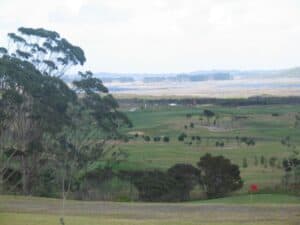 Karikari Golf Course, Far North, New Zealand |
By 1871, Howden was financially secure, and with his youth and enthusiasm he began the development of golf in New Zealand. The first golf club was established in September 1871, the Dunedin Golf Cub. There were twelve members and Charles Ritchie Howden was the first club captain. The first games were played at Caversham, and the nine-hole course at Mornington. For the next couple of years, regular competitions took place at the Mornington golf course, but the nature of the course assured it of a short life. The golf course was shared with cows and although they kept the grass down they caused considerably damage to the greens. The course became unplayable and by 1876 the game was no longer being played.
|
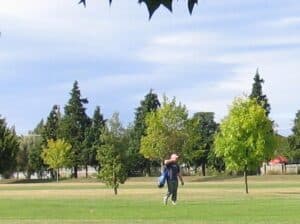 Blenheim Golf Course, Marlborough, New Zealand |
|
It was nearly twenty years before golf once again took organised shape, but four historic trophies had been established, the Bruntsfield Medal, St Andrews Cross, The 1871 Cup and the Telfer Medal.
|
||
|
Golf In New Zealand Today
New Zealand is a golfing paradise with over 400 beautiful courses, featuring superb and varied playing surfaces amongst some of the most breathtaking scenery.New Zealand has the most golf courses per population than any other country in the world, with 150,000. Golf courses are in all cities and most rural communities.. Grass grows well in New Zealand, and most courses have very lush rough. Hills are often present and sand is freely available, so beware of the sand traps. The fairways are smooth and flat and the greens soft and true, unless you play on some rural courses where sheep are used as fairway mowers. To play on New Zealand’s golf courses it is not essential to book, although it is advised. Some of the larger city golf courses do require bookings, as they are usually very busy. Green fees vary from as low as NZ$5 for a small rural 9-hole course to NZ$200, for a top resort course. The average green fee is around NZ$30. The larger clubs usually have carts and clubs for hire. |
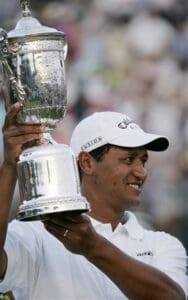 Michael Campbell Captures the US Open, 2005 |
New Zealand’s Greatest Golf Moments
Sir Bob Charles – New Zealand’s first successful international golfer with a total of 48 wins since 1960. He was the first New Zealander to win a major, the British Open in 1963. He also has 5 US PGA Titles, 3 NZ PGA Championships and 9 other distinguished golfing accomplishments worldwide – including the World Match play Championship in 1969.Michael Campbell – In June 2005, Michael Campbell captured the US Open Championship and later that year, won the World Match play Championship. He has been ranked as high as 12th in the world. Michael has 5 European titles amongst his previous nine wins worldwide. Craig Perks – In 2002, Craig won the 5th major, the USPGA Players Championship. David Smail – In 2002, Smail won the Japan Open and has three career wins. Phillip Tataurangi – Tataurangi has won titles on three professional tours, the Australasian, Nationwide and US PGA. |
RugbyHistory Charles Monro learnt and enjoyed the game of rugby while studying in England. Once his studies were complete, Charles Monro returned to Nelson, New Zealand where he suggested the local football club try out rugby rules. The club enjoyed the game and adopted the rules. Among the football club members were students of Nelson College, who took the game of rugby back to the school. |
||
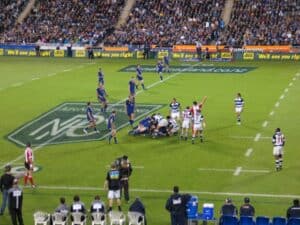 2005 NPC final between Auckland and Otago. |
On Saturday, 14 May 1870, Nelson College played Nelson Club at the Botanical Reserve, Nelson. This was the first interclub rugby union football match to be played in New Zealand. Rugby was born. Monro visited Wellington later that same year, where he organised a game between Nelson and a Wellington team, which had been playing Melbourne rules football. The match was played at Petone on the 12th of September and was won by Nelson. On the 12th of May, as a result of this game the Wellington club was founded. Rugby spread throughout New Zealand, and just about every region had a representative rugby club and team. |
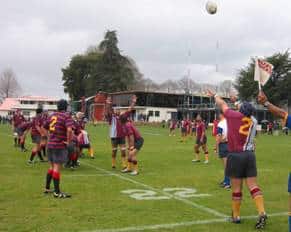 2003 Secondary Schools final between De La Salle and Rotorua Boys. |
|
Rugby in New Zealand Today
Rugby is considered the national sport of New Zealand. It is the fifth most popular sport for males with 11% of adult men playing the game. Females also play rugby. Most city and rural provinces have club and representative teams, and play games on a weekly basis throughout winter.Rugby has many followers and large numbers of spectators attend weekly fixtures throughout the country, supporting all levels of rugby, from Club to Provincial. Club rugby is often referred to as ‘Grass Roots’ rugby, and many of New Zealand’s top players can regularly be seen playing for their club. Players are picked from their clubs to represent their Province. The National Provincial Championship (NPC) is New Zealand’s leading national rugby competition. Each province in New Zealand is represented and put into two divisions, depending on their level of rugby. Rugby was an amateur sport until 1996 when it turned professional. Professional rugby has brought with it more demands on players, with an increasing number of competitions. New Zealand is involved in the Super 14 Competition, which involves teams from New Zealand, Australia and South Africa. New Zealand teams have dominated the competition since it began in 1996. New Zealand’s representative team is called the All Blacks. The players are selected from NPC and Super 14 level. International games are played throughout the year. New Zealand is involved in an annual competition called the Tri Nations with Australia and South Africa. |
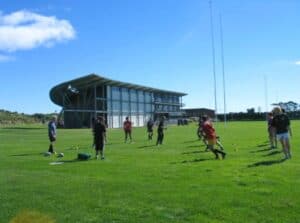 Players going through their skill drills with their tutor John Boe at the Palmerston North Rugby Academy.  NPC division 1 game between Auckland and North Harbour |
Some of New Zealand’s Recent Rugby Successes
The World Cup – The rugby world cup began in 1987 and New Zealand was the inaugural winners beating France in the final. Since then, New Zealand has been unable to recapture the glory of lifting the world cup, despite great results against international opposition and dominating world rugby.Tri Nations – The tri nations title is fiercely fought for every year between New Zealand, South Africa and Australia. Since it began in 1996 New Zealand has won the title 6 times. The 2005 All Blacks Lions Tour – The British and Irish Lions tour was touted as being one of the greatest tour parties to every land on our shores. They were to play a number of matches against provincial teams, and three test matches against the All Blacks. The All Blacks went on to win all three test matches. Grand Slam tour of 2005 – The New Zealand All Blacks Grand Slam tour of the UK and Ireland saw victories over all four countries, Wales, Ireland, England and Scotland. It was a great feat and only been done once before. The results from 2005 reaffirmed the All Blacks dominance in world rugby, with victories over most of the strongest test playing nations. |
SoccerHistory Soccer came to New Zealand with the arrival of many European settlers and traders, playing the game in their spare time. Reverend J.S. Hill has been credited with starting the first organised games of soccer in New Zealand, in the 1880’s. New Zealand’s first soccer association, The Northern Association Football Club of Dunedin, was formed on 11 April 1888. With the increasing popularity of the game more soccer associations formed and in 1890, the New Zealand Association was established to administer the game on a national basis. |
||
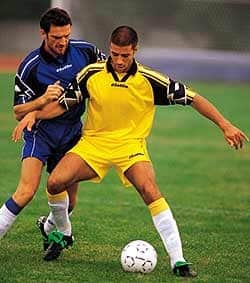 Mens Soccer match |
The first inter-provincial game of soccer in New Zealand was played on the 16 th of August 1890, between Wellington and Christchurch.
Due to travel constraints, most soccer matches were played between teams from the same province. In 1923, the Chatham Cup competition began. The cup was donated to the New Zealand Football Association by the ship’s complement of HMS Chatham. Any team in New Zealand could enter on a knockout basis. Preliminary rounds are determined at local association level. The winning teams then play off in the zone competition before moving on to the North Island and South Island competitions. Finally the best team from the North Island plays the best from the South. The final is always played in Wellington. |
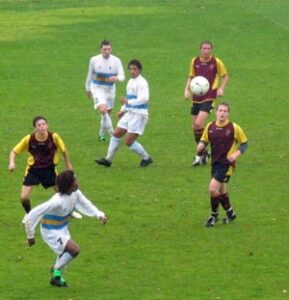 School Soccer match |
|
Soccer in New Zealand Today
Soccer still remains a highly popular winter sport for males in New Zealand. The Chatham Cup is still contested for, along with inter-provincial club games. International games are somewhat of a rarity as overseas clubs put more emphasise on their club competitions.New Zealand recently entered a professional team into the Australian Football League, called the NZ Football Kingz. The team has struggled since its inception into the competition. New Zealand’s national team is called The All Whites, which is reflected in their white playing strip. The players are selected from all over the world as many of New Zealand’s top footballers play overseas, where the money and recognition is better. This often results in many selected players making themselves unavailable for international matches, due to travel time and club demands. Despite soccer’s global appeal and recognition, soccer does not have a great supporters base and therefore, does not get much airtime on television. The Kingz games are usually the only games broadcast onto television. |
 New Zealand Football Kingz player on the move. |
 Kidz Soccer Great New Zealand Soccer Moments
1982 World Cup – This ranks as one of New Zealand’s greatest sporting achievements. Soccer was struggling for media coverage and recognition and the players were virtually unknown. Once they qualified there was a media frenzy and the country was captivated. The players became household names. Although they did not do too well in the competition, it was just so amazing they made it there. Confederations Cup – In 1999, New Zealand qualified for the FIFA Confederations Cup in Mexico, by defeating Australia 1-0 to win the 1998 OFC Nations Cup in Brisbane. In 2003, New Zealand qualified for their second Confederations Cup in France with another 1-0 win over Australia. |
CricketHistory
Cricket was very popular in England in the nineteenth century, and many of the early missionaries brought with them, the love and passion for the game. Cricket can almost certainly claim to be the first organised game played regularly in New Zealand. Records suggest the game was first played here in the early 1830’s, when orders for cricket gear were sent to England.In March 1844, the first fully recorded match was played at Nelson, with Nelson beating the surveyors of the New Zealand Land Company. The early games were played in tall hats, cravats and trousers tight at the ankle. It was a custom for both teams to enjoy a big meal after the game. |
||
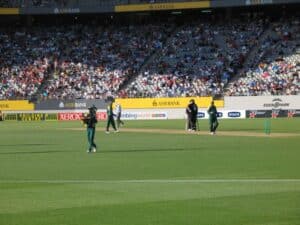 One-Day International between New Zealand and Pakistan, played at Eden Park, Auckland, New Zealand. |
The first inter-provincial match was between Auckland and Wellington in 1860, and the second inter-provincial was played two years later between Wellington and Nelson.
The first overseas team to play in New Zealand was George Parr’s All-England Eleven in 1864. The successful tour was arranged and sponsored by Shadrach Jones, a Dunedin publican. More overseas teams followed and by 1890 three teams from England and Australia, and a team from Tasmania and New South Wales had visited. In 1894 the first New Zealand representative team was selected. A.M Ollivier of Christchurch was given the task of selecting a team to face a team from New South Wales. |
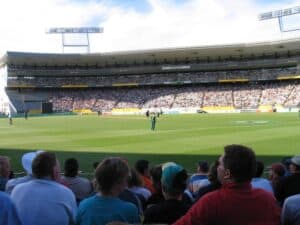 One-Day International between New Zealand and Pakistan, played at Eden Park, Auckland, New Zealand. |
|
By this time, cricket had become well established in the main centres where clubs were formed and interclub games played. Cricket was the national sport at the time.
|
||
|
Cricket in New Zealand Today
Cricket is New Zealand’s national summer game with the fourth highest participation rate amongst men. Women also play cricket, which is played at school, club, provincial and International levels.New Zealand Domestic cricket is played in two versions of the game, the 4-5 day match version, for the State Championship and the shortened 1-day format, for the State Shield. With its high participation rate, domestic cricket does not attract many spectators, probably due to the length of a game. Players are selected from their provincial teams to represent the Black Caps, New Zealand’s representative cricket team. |
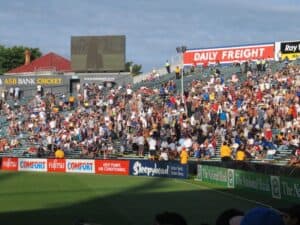 Crowd support at a One-Day International between Pakistan ans New Zealand at Eden Park, Auckland, New Zealand |
New Zealand Crickets Recent Achievements
October 2000 – The Black Caps beat India in the one-day ICC knockout final, their first ever tournament win.April 2002 – New Zealand beat England in a test match on English soil for the first time in 18 years. June 2002 – New Zealand wins their first ever test series against the West Indies on West Indian soil. May 2003 – The Black Caps win the Bank Alfalah Cup triangular series against Sri Lanka and Pakistan. Their second overseas tournament wins. January 2004 – Black Caps demolish Pakistan 4-1 in a one-day series February 2004 – New Zealand wins its first ever series win in any form of cricket against South Africa, winning a one-day series 5-1. July 2004 – Black Caps win the NatWest one-day international tri-series against England and the West Indies. Black Caps are ranked 2nd in the world in the one-day international standings. |
Netball |
||
|
History
Netball was originally called Basketball and was introduced to New Zealand in 1906, by the Rev J.C Jamieson, who started teams up from his Bible classes. The first teams were the A and B teams at the St Luke’s Presbyterian Church in Remuera, Auckland. The games were played on a paddock and consisted of nine players on each side. Players were allowed three bounces and throws from one end of the court to the other. Baskets were used as goals and after each goal the ball had to be tipped out.The game grew in popularity and was being played throughout New Zealand. The first official representative match was played in Wellington in 1923, between Wellington and Canterbury. The New Zealand Basketball Association was formed in 1925, to have discussions about controlling the game. Decisions made included Election of Officers, Venue of Annual Meetings, Colours (Black with Silver Fern), Voting Power, and Affiliation Fees. Talks were held on the playing rules to try and get everyone playing under the same rules. Each province had their own association with their own representatives, who attended the discussions. In 1925 the first meeting was held and representatives from Auckland, Wellington, Canterbury, Otago, Southland and Nelson attended. In April 1926, the first New Zealand Tournament was played between the existing six associations. By 1932 there were 15 affiliated associations, with a total of 742 teams. The first New Zealand representative team sailed to Australia on the 4 th of August 1938. |
||
Rugby League |
||
|
History
In 1907, A.H Baskerville organised a team for a tour of England. The team was known as the All Gold team and contained a number of the 1905 All Blacks. None of the players knew the rules of rugby league, as the game had never been played in New Zealand before. They played 35 matches, winning 19 and drawing two, great results considering Rugby League had been established in England for more than 12 years. The team played 13 matches in Australia on the way home, winning 9 and drawing 1.The following year after the tour, League was established in New Zealand and the first match was played in Wellington, on the 13 th of June 1908. A crowd of nearly 7,000 watched the exhibition game between two teams drawn from the touring side. By 1910 Rugby League was being played in Auckland, Taranaki, Rotorua, Nelson, Southland, Wanganui, Marlborough, Invercargill, Hawke’s Bay and South Auckland. |
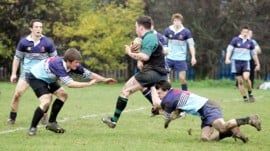 Mens Rugby League Match New Zealand’s greatest Rugby League Moments
League is predominantly played in Australia, England and New Zealand, so most international matches are played against each other. A great victory is any time the Kiwis beat the world champions, Australia. Australia have always dominated world Rugby League.27 November 2005 – New Zealand beats Australia in the Gillette tri-nations final, the first time New Zealand has ever beaten Australia in a test series. The tri-nations also involved Great Britain, whom New Zealand also beat. Earlier in the series, New Zealand had a very rare win on Australian soil. |
Rugby League in New Zealand Today
Rugby League has a strong following in New Zealand and has a high participation rate among both men and women. The game is played in wintertime and competes with Rugby and Soccer for supporters.Rugby League is played at provincial club level in the larger cities, where you will find most suburbs have a representative team. New Zealand Leagues premier competition is the Bartercard Cup, which involves club teams from Auckland, Northland, Waikato, Manawatu, Wellington and Canterbury districts. New Zealand also has a representative team in the NRL, Australia’s premier grade Rugby League Competition. The team is called the New Zealand Warriors, and consists of some of New Zealand’s and Australia’s finest players. Players are selected from various professional clubs form Australia and Great Britain to represent New Zealand for international matches. The New Zealand team is called the Kiwis. |
Touch |
||
|
History
Touch started in Australia during the 1950s and 60s as a training technique for Rugby League. Touch became very popular and it was soon being played throughout Australia as a recreational sport.Touch spread across the Tasman and was soon being played extensively throughout New Zealand. The game appealed to all ages and both sexes. With the growing popularity of touch it was decided in 1985 to form the Federation of International Touch. On the 23rd of March 1985, the first recognised international game was played between Australia and New Zealand. |
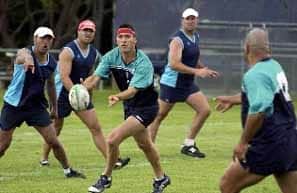 Open Mens Touch Game |
Touch in New Zealand Today Teams are entered into local competitions. To represent your province you have to attend trials and compete for a position. Provincial games are played in tournaments. The New Zealand players are selected from the provincial competitions. New Zealand competes regularly against Australia in men, women and mixed touch. There is a touch world cup, held every four years. |
Softball |
||
|
History
George Hancock invented Softball in 1887. The game was originally called mushball, kittenball or indoor baseball as the game was played indoors. By the spring of 1888, the game was being played outdoors. It was in the 1920s softball acquired its name and in 1933 the sport became organised in the United States.Mr W.H Wilson, of the Ford Motor Company introduced softball to New Zealand in 1935, along with many other visiting American sailors, who were brought here on a tour of duty. In 1937/38 the first organised competitions took place and the first Softball Association was formed. |
||
